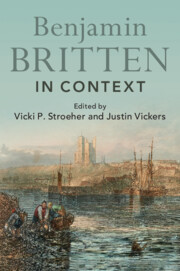Book contents
- Benjamin Britten in Context
- Composers in Context
- Benjamin Britten in Context
- Copyright page
- Dedication
- Contents
- Figures
- Tables
- Notes on Contributors
- Acknowledgements
- Bibliographic and In-Text Abbreviations
- Prologue
- Part I The Britten Circle(s)
- Part II British Musical Life
- Chapter 7 Composing in England
- Chapter 8 Britten and Film
- Chapter 9 Britten and the Radio
- Chapter 10 Recording a Musical Experience: Britten’s Works on Record and Television
- Chapter 11 Music Critics and the Press
- Chapter 12 Britten and English Opera
- Chapter 13 Festival Culture in the British Isles
- Chapter 14 Concert Life in Britain
- Chapter 15 Benjamin Britten and Folk Song
- Chapter 16 Educating the Nation
- Part III Britten and Other Composers
- Part IV Wordsmiths, Designers, and Performers
- Part V British Sociocultural, Religious, and Political Life
- Further Reading
- Index
Chapter 8 - Britten and Film
from Part II - British Musical Life
Published online by Cambridge University Press: 31 March 2022
- Benjamin Britten in Context
- Composers in Context
- Benjamin Britten in Context
- Copyright page
- Dedication
- Contents
- Figures
- Tables
- Notes on Contributors
- Acknowledgements
- Bibliographic and In-Text Abbreviations
- Prologue
- Part I The Britten Circle(s)
- Part II British Musical Life
- Chapter 7 Composing in England
- Chapter 8 Britten and Film
- Chapter 9 Britten and the Radio
- Chapter 10 Recording a Musical Experience: Britten’s Works on Record and Television
- Chapter 11 Music Critics and the Press
- Chapter 12 Britten and English Opera
- Chapter 13 Festival Culture in the British Isles
- Chapter 14 Concert Life in Britain
- Chapter 15 Benjamin Britten and Folk Song
- Chapter 16 Educating the Nation
- Part III Britten and Other Composers
- Part IV Wordsmiths, Designers, and Performers
- Part V British Sociocultural, Religious, and Political Life
- Further Reading
- Index
Summary
Britten’s early love for the cinema - when he was spellbound in particular by the work of Charlie Chaplin and the Marx Brothers - and his later apprenticeship as a composer for documentary films in the 1930s are both charted in this chapter, which analyses his comments on the medium in his youthful letters and diaries and goes on to consider the impact film music had on his later stylistic development as a composer of works for the stage. High points of his own work in film include his scores for the General Post Office (GPO) Film Unit, including two celebrated collaborations with the poet W. H. Auden (Coal Face, 1935; Night Mail, 1936), his score for the feature film Love from a Stranger (1937), and his virtuosic orchestral music for Muir Mathieson’s educational film Instruments of the Orchestra (1946). The chapter concludes with an account of Britten’s close involvement with his own local cinema in Aldeburgh during the late 1960s.
Keywords
- Type
- Chapter
- Information
- Benjamin Britten in Context , pp. 71 - 77Publisher: Cambridge University PressPrint publication year: 2022

